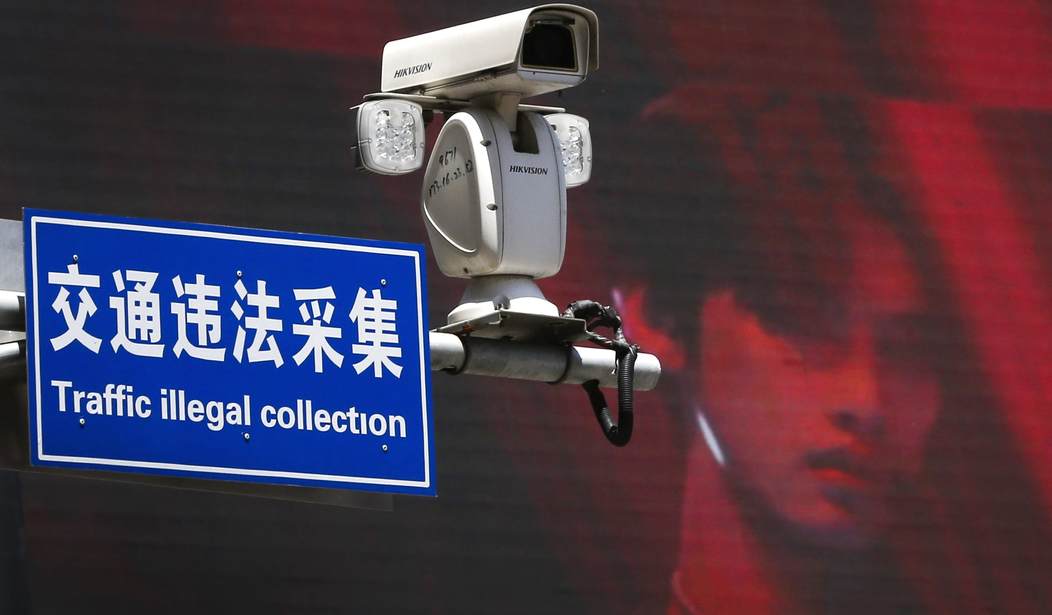China’s growing surveillance state has made the news again. The NYT described a “God’s-eye” — perhaps better described as a State’s-eye — view of Chinese society as seen from the millions of networked devices that are blanketing the country.
At the click of a mouse … the police can pull up live video from any surveillance camera … passing through one of the thousands of checkpoints in the city.
To demonstrate, she showed how the system could retrieve the photo, home address and official identification number of a woman who had been stopped at a checkpoint on a major highway. The system sifted through billions of records, then displayed details of her education, family ties, links to an earlier case and recent visits to a hotel and an internet cafe.
The combination of ubiquitous sensors and database fusion has allowed the Communist Party to create “virtual cages” for millions of people. It’s easy with Internet of Things technology to turn off an individual’s credit card, phone, car, refrigerator, etc., should he stray into a proscribed zone.
The Times notes the nightmare, saying that “it is also a vision that some of President Trump’s aides have begun citing in a push for tougher action against Chinese companies in the intensifying trade war. Beyond concerns about market barriers, theft and national security, they argue that China is using technology to strengthen authoritarianism at home and abroad — and that the United States must stop it.”
Suddenly a war over the future of the internet has broken out. It is perhaps the first major conflict over a nonphysical system in the history of the world and it has come to the front rank virtually by surprise after decades of the public being told tomorrow would be a world without borders.
Escalating tensions between Washington and Beijing are wiping billions from the net worth of China’s richest surveillance tycoons. … The losses deepened on Wednesday after reports that Donald Trump’s administration is considering blacklisting the surveillance giants, in part because of their alleged role in human rights violations.
The virtual high ground of this new war is the architecture of 5G, “digital cellular networks, in which the service area covered by providers is divided into a mosaic of small geographical areas called cells,” with up to a million devices per square kilometer. This creates an ecosystem teeming with electronic life, the Internet of Things, where “everything from toasters to dog collars to dialysis pumps to running shoes will be connected. Remote robotic surgery will be routine, the military will develop hypersonic weapons, and autonomous vehicles will cruise safely along smart highways.”
It would also be the scaffolding of China’s virtual cage. Whoever controls 5G will be able to surveil and control the planet. Those in charge of the network could be omniscient and potentially omnipotent over unprotected man-made systems. To guard against China ruling this kingdom, the Trump administration has banned U.S. companies, most notably Google, from selling technology to Chinese giant Huawei.
The urgency of the challenge was underscored by The Hill’s comparison of the situation to Apollo. “We are in another innovation race right now. The race to 5G [is] a contest that could have more far-reaching effects than the race to the moon. The Trump administration deserves credit for articulating a policy that aims to see America win the race to 5G.” Steve Bannon had an even more extreme formulation: “It is a massive national security issue to the West. The executive order is 10 times more important than walking away from the trade deal. It [Huawei] is a major national security threat, not just to the US but to the rest of the world. We are going to shut it down.”
While stopping China might prevent the worst, it will not end the threat. 5G is like Sauron’s ring. As long as it exists, someone — the EU, Washington, Big Silicon or Western industry — will wear it. The result may not be Beijing’s “virtual cage,” but it will potentially be an electronic jail nonetheless. Who can resist wielding such power?
Huawei has even promised to sign “no-spy agreements with governments“. That’s a rather ridiculous suggestion – as if signing an agreement would prevent Chinese intelligence agencies from using Huawei equipment for surveillance if they could. …
Those are all valid points, but they apply equally to many products from Western companies. One approach is to ensure that traffic is properly encrypted before it even gets to touch the 5G infrastructure, which should always be assumed to be insecure. Concerns about hardware vulnerabilities are yet another argument for implementing end-to-end encryption everywhere. That’s by no means a panacea – even encrypted streams can leak information – but it’s a necessary first step.
Former National Security Council staffer Brigadier General Robert Spalding has concluded that the threat is so great the only alternative is to cast the ring into Mount Doom and redesign 5G from scratch.
Spalding’s solution, he told me, was to build the 5G network from scratch, incorporating cyber defenses into its design. Because this would be a massive undertaking, he initially suggested that one option would be for the federal government to pay for it and, essentially, rent it out to the telecom companies. But he had scrapped that idea. A later draft, he said, proposed that the major telecom companies—Verizon, A.T. & T., Sprint, and T-Mobile—form a separate company to build the network together and share it. “It was meant to be a nationwide network,” Spalding told me, not a nationalized one. “They could build this network and then sell bandwidth to their retail customers. That was one idea, but it was never that the government would own the network. It was always about, How do we get industry to actually secure the system?
But who’s to guarantee its replacement won’t be even more sinister? The temptation to spy on the public, for commercial or political reasons, is becoming hard to resist. “The danger,” noted Glyn Moody, “comes not just from Chinese companies. The risk is that Western companies will … follow suit in developing ever-more intrusive products and services with surveillance at their heart, or be left behind in the great 5G race.” In fact, it already has, as Bruce Schneier pointed out in a 2013 article. We’ve already clapped the digital manacles on ourselves.
The Internet is a surveillance state. Whether we admit it to ourselves or not, and whether we like it or not, we’re being tracked all the time…. There are simply too many ways to be tracked. The Internet, e-mail, cell phones, web browsers, social networking sites, search engines: these have become necessities, and it’s fanciful to expect people to simply refuse to use them just because they don’t like the spying …
This isn’t something the free market can fix …. In today’s world, governments and corporations are working together to keep things that way. Governments are happy to use the data corporations collect — occasionally demanding that they collect more and save it longer — to spy on us. And corporations are happy to buy data from governments. Together the powerful spy on the powerless, and they’re not going to give up their positions of power, despite what the people want. …
Welcome to an Internet without privacy, and we’ve ended up here with hardly a fight.
It may the biggest challenge Western civilization has faced since World War II. The irony is that the conflict with Russia, a supply chain war with China, and the prospect of a global electronic jail were largely invisible to the media before 2016, although they were probably “felt” by a large number of voters who knew something was wrong but couldn’t put their finger on exactly what. The question now is which was fiction: the halcyon days of the global connectedness or the threats we face today?
Follow Wretchard on Twitter
Tipjar at wretchard.com
Support the Belmont Club by purchasing from Amazon through the links below.
Books:
Mindwise: Why We Misunderstand What Others Think, Believe, Feel, and Want, by Nicholas Epley. An introduction to what scientists have learned about our ability to understand the most complicated puzzle on the planet – other people – and the surprising mistakes we so routinely make.
1776, by David McCullough. This book tells the dramatic story of the year of America’s birth, interweaving the actions and decisions that led Great Britain to undertake a war against her colonial subjects and those that placed America’s survival in the hands of George Washington.
Chosen Soldier: The Making of a Special Forces Warrior, by Dick Couch. The author offers an unprecedented view of the training of the Green Berets, from the demanding selection process and gruelling field exercises, the high-level technical training and intensive language courses, and the simulated battle problems that test everything from how well they gather operational intelligence to their skills at negotiating with often hostile local leaders.
The Slight Edge: Turning Simple Disciplines into Massive Success and Happiness, by Jeff Olson and John David Mann. This book outlines a way of thinking and processing information that creates powerful results from the simple daily activities of your life, by using tools already within you.
For a list of books most frequently purchased by readers, visit my homepage.
Did you know that you can purchase some of these books and pamphlets by Richard Fernandez and share them with your friends? They will receive a link in their email and it will automatically give them access to a Kindle reader on their smartphone, computer or even as a web-readable document.
The War of the Words, Understanding the crisis of the early 21st century in terms of information corruption in the financial, security and political spheres
Rebranding Christianity, or why the truth shall make you free
The Three Conjectures, reflections on terrorism and the nuclear age
Storming the Castle, why government should get small
No Way In at Amazon Kindle. Fiction. A flight into peril, flashbacks to underground action.
Storm Over the South China Sea, how China is restarting history in the Pacific.










Join the conversation as a VIP Member